Understanding Roman Childhood
Roman childhood was a clearly defined stage in the life cycle, marked by specific customs and social expectations. Children in the empire were not simply miniature adults; they experienced a unique phase of growth that involved care, education, and gradual integration into society. From infancy to adolescence, each period had distinct roles and responsibilities shaped by family, gender, and social status.
Studying Roman Childhood: Growing Up in the Empire provides valuable insights into how the broader Roman society functioned. Childhood offers a window into family structures, educational practices, and cultural values. It reveals how Romans prepared their young for citizenship, military service, or managing households—key pillars of the empire’s stability.
Key points about Roman childhood include:
- Infants were primarily cared for by female family members.
- Childhood was divided into stages with increasing duties.
- Education played a central role for boys; girls focused more on domestic skills.
- Social status heavily influenced experiences and opportunities.
Understanding Roman childhood helps you grasp the complexities of Roman culture beyond politics and warfare. It shows how future generations were molded to maintain the empire’s traditions and social order. This foundation sets the stage for exploring phases of childhood, gender roles, education, family influence, playtime, social inequalities, and preparation for adult responsibilities within Rome’s vast empire.
The legacy of Ancient Rome remains a cornerstone of Western civilization. From its inception as a small city-state to its transformation into a vast empire, Rome’s influence is both profound and enduring. The impact of Roman culture, governance, and innovations can be seen in various aspects of modern society.
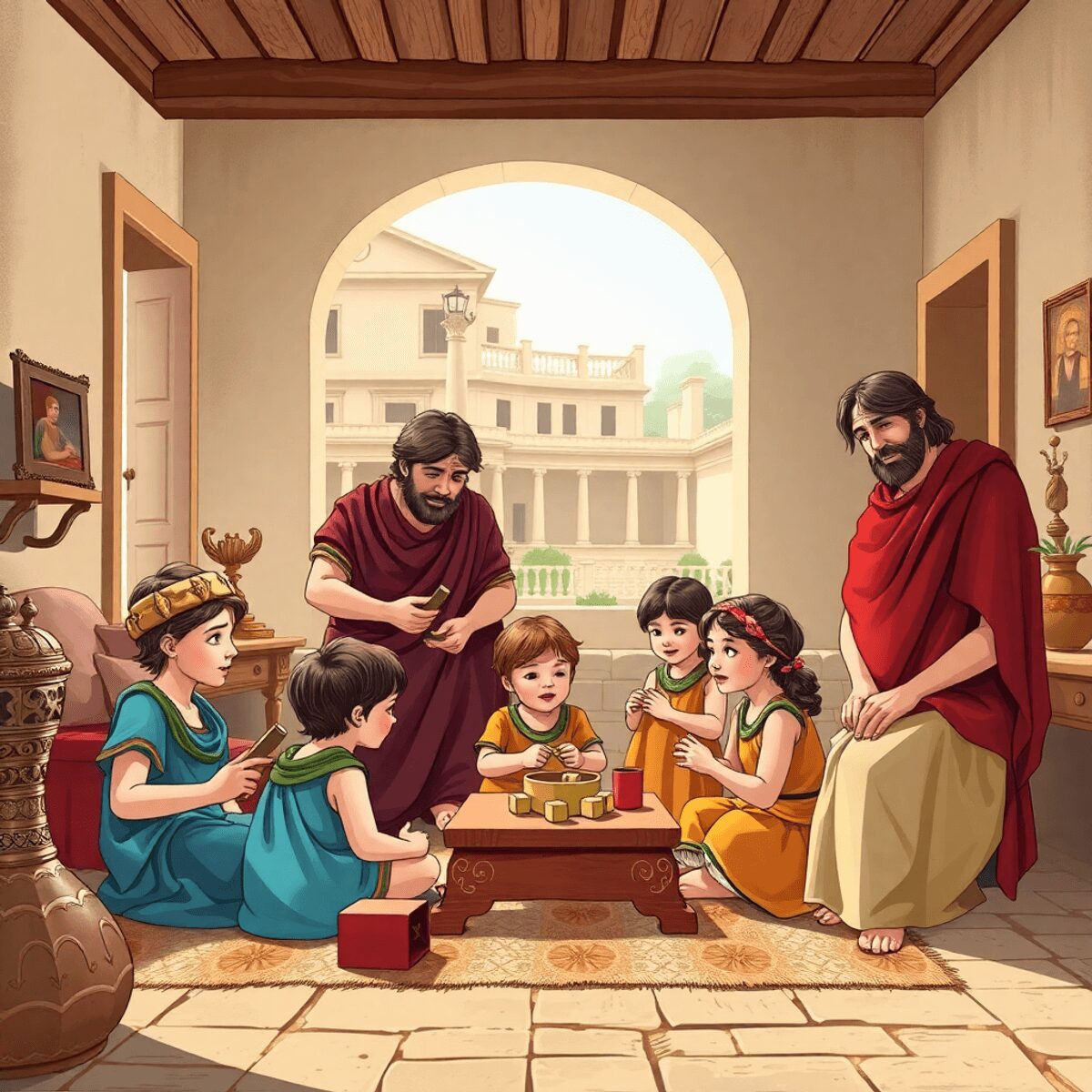
Phases of Childhood and Gender Roles in Ancient Rome
In ancient Rome, a society characterized by distinct phases of childhood and rigid gender roles, the upbringing of children was significantly influenced by their societal roles. These phases of childhood included the following aspects:
1. Infancy and Early Childhood
The early years, up to the age of seven, were considered infancy. During this time, children relied heavily on women in the family, especially their mothers, for care and nurturing. Women played a crucial role in shaping the early experiences of children, providing them with a foundation for growth and development.
2. Transition to Responsibilities
As children grew older, typically around age eight, they began to take on increasing responsibilities within the household. This transition was marked by a clear demarcation in tasks assigned to boys and girls based on entrenched gender roles. Boys might assist with outdoor work or accompany their fathers to learn trades, while girls were taught domestic skills like cooking, weaving, and childcare.
3. Gender Roles
Gender played a significant role in defining the responsibilities and expectations placed on children. Boys were groomed for future leadership roles in society, emphasizing physical fitness, discipline, and education in areas like rhetoric and philosophy. On the other hand, girls were prepared for domestic duties and motherhood, focusing on skills related to managing a household and raising children.
These distinct phases of childhood in ancient Rome reflected the societal norms and expectations surrounding gender roles and family dynamics. The transition from infancy to assuming responsibilities marked a crucial period in a child’s development, shaping their future roles within Roman society.
To understand more about the societal structure of ancient Rome including the influence of art and culture during this period or delve into the lives of the wealthy elite known as patricians, one can explore these comprehensive resources.
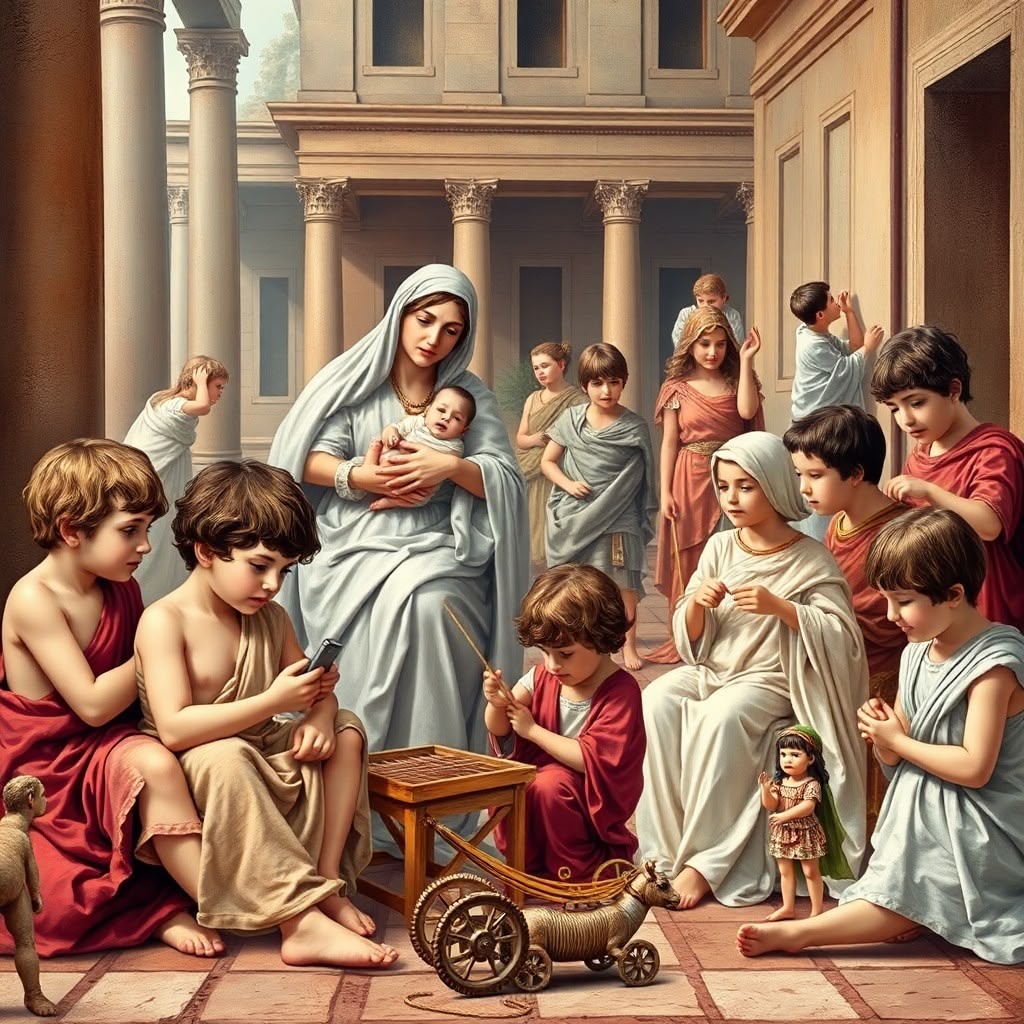
Education and Rites of Passage in Roman Society
Roman society marked the transition from infancy to youth through specific rites of passage that held social and cultural significance. One key marker was the toga virilis ceremony, typically occurring around the age of 14 for boys. This event symbolized their official entry into adulthood and citizenship, signifying new responsibilities and privileges within the complex political structure of the Roman Republic, which laid the foundation for modern democracies. Girls, on the other hand, experienced transitions more closely linked to marriage readiness rather than formal ceremonies.
The Role of Education in Shaping Futures
Education played a critical role in shaping a child’s future within Roman society. For boys, education was often rigorous and comprehensive, especially among elite families. They learned:
- Reading and writing
- Arithmetic
- Rhetoric and public speaking
- Greek language and literature, reflecting Rome’s admiration of Greek culture
This education prepared boys for careers in politics, law, or military service, reinforcing their expected roles as public figures or leaders within the vast expanse of the Roman Empire.
In contrast, girls generally received less formal schooling. Their education focused primarily on domestic skills such as:
- Spinning and weaving
- Managing household finances
- Child-rearing practices
These skills aligned with societal expectations for women to manage the home and family affairs effectively.
Teaching Methods and Values Instilled
Teachers or ludi magister guided young students through their lessons, often using wax tablets and styluses. The importance of education extended beyond practical knowledge; it was a tool for instilling Roman values like discipline, loyalty to family and state, and respect for tradition.
Preparing Children for Their Roles
The combination of rites of passage and structured education ensured children were prepared mentally and socially to fulfill their designated roles within the empire’s complex hierarchy. This preparation was crucial not only for individual success but also for maintaining the overall stability and functionality of the empire’s intricate governance system. Such educational practices are part of a broader understanding of how education has shaped societies throughout history, influencing everything from personal development to societal structure.
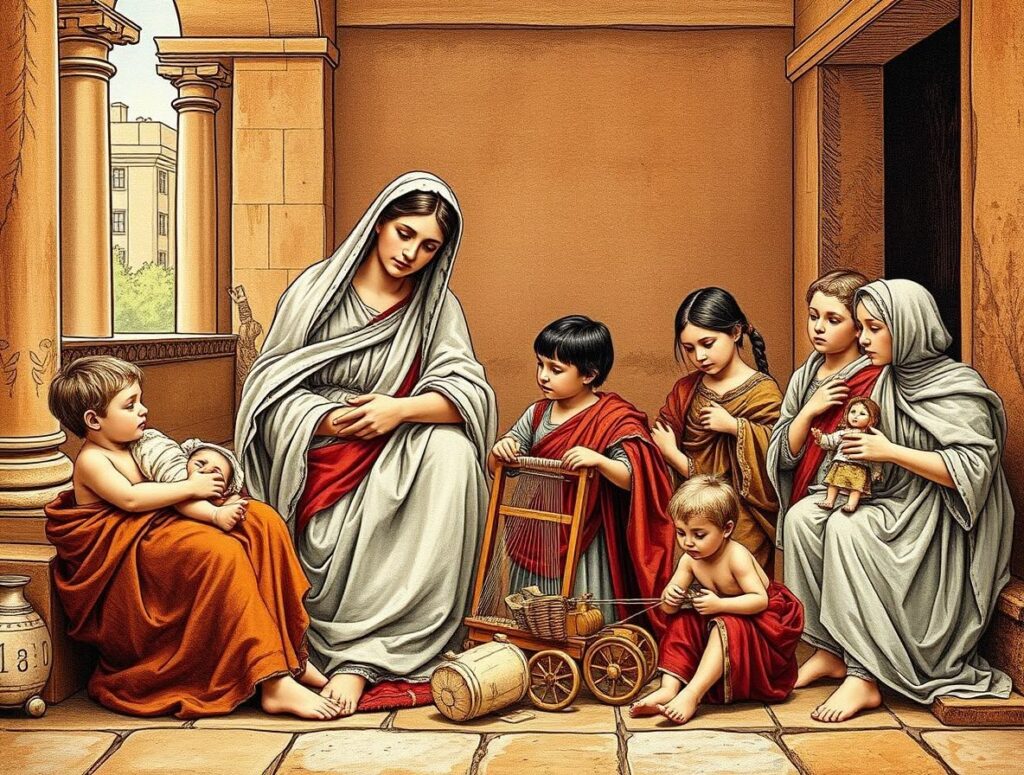
The Role of Family in Shaping Roman Childhood Experiences
Family life played a crucial role in shaping Roman childhood experiences, influencing children’s morals and social behavior. Parents had significant responsibilities in guiding their children through moral education and social interactions.
Parental Influence
- Moral Education: Parents were key figures in instilling virtues, ethical values, and societal norms in their children. They were responsible for teaching concepts of honesty, loyalty, respect, and obedience.
- Social Education: Beyond moral teachings, parents also guided children on how to interact with others, emphasizing etiquette, manners, and respect for authority.
Family Dynamics
In the Roman household, extended family members such as grandparents, aunts, and uncles often played a role in a child’s upbringing. They contributed to the child’s education by sharing wisdom, traditions, and cultural practices.
The dynamics within the family unit greatly impacted a child’s formative years. The nurturing environment provided by the family helped shape the child’s understanding of societal norms, relationships, and responsibilities. Through daily interactions and guidance from family members, children learned how to navigate the complexities of Roman society and develop into contributing members of their community.
In Roman culture, familial bonds were central to a child’s growth and development. The intergenerational transmission of values and customs ensured continuity in societal beliefs and practices. This emphasis on family cohesion underscores the importance of familial influence in shaping Roman childhood experiences.
Moreover, the values instilled by families often influenced broader societal aspects. For instance, the military achievements of figures like Scipio Africanus, who changed the course of history during his time, can be traced back to the foundational morals and discipline ingrained during childhood. Similarly, the strict adherence to principles laid down by Roman Law, which has shaped modern legal systems, reflects the societal norms that families transmitted across generations.
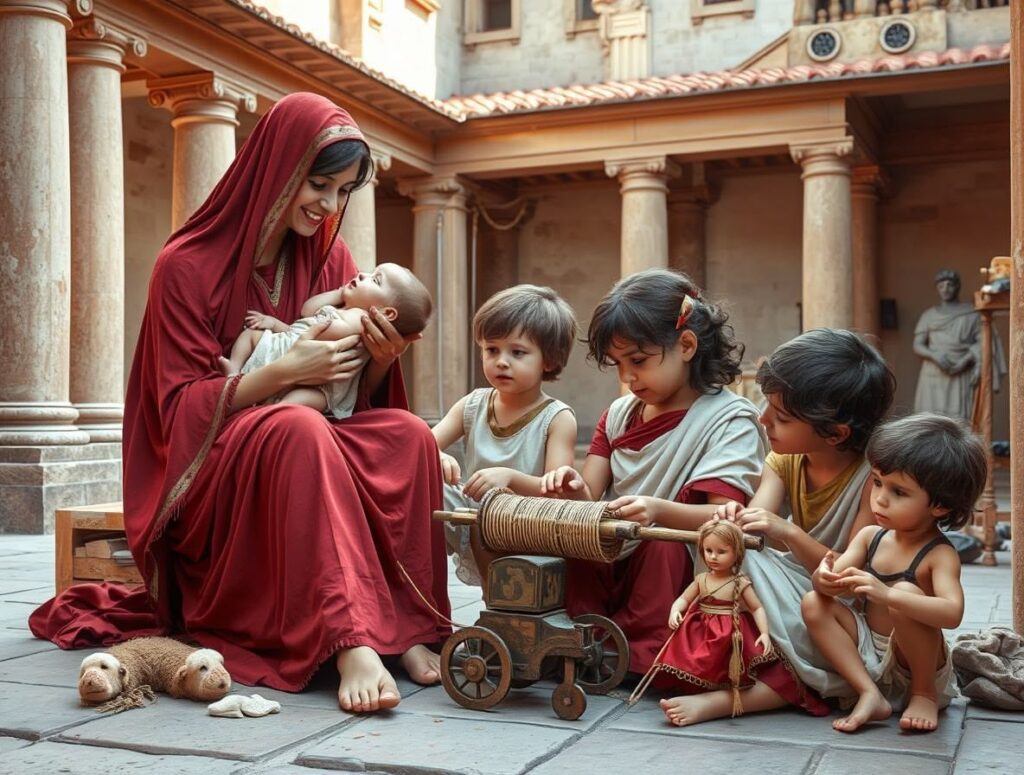
Playtime and Socialization: Toys and Games in Roman Childhood
Role of toys and games in reflecting daily life and societal roles
Ancient Roman children had a variety of toys that mirrored aspects of adult life. For example, miniature chariots, dolls, and toy soldiers were popular playthings that emulated activities like racing events or military campaigns. These toys not only entertained children but also served as tools for socialization, teaching them about societal roles and expectations from a young age.
Influence of play on socialization and learning in Roman children, with examples of popular toys and games
Play was a fundamental part of Roman childhood, facilitating social interaction and skill development. Games like knucklebones (similar to jacks), dice games, and board games such as “latrunculi” (a strategic military game) were common pastimes for children. Through these activities, children learned important social skills like cooperation, competition, and strategic thinking. Additionally, role-playing with dolls or miniature household items helped inculcate cultural norms and values within the younger generation.
By engaging in play with toys and games that mimicked their society’s structures and values, Roman children not only entertained themselves but also absorbed essential lessons about their future roles as citizens within the empire. This concept of role-playing is not too far removed from modern times; for instance, JP Farmer, who immerses himself in role-playing games like Second Life, finds parallels between his experiences there and the historical context of Roman childhood play.
The lessons learned through these playful interactions extended beyond mere entertainment. They were foundational in shaping the character of future citizens who would later contribute to significant historical events such as the birth of the Roman Republic, which marked a critical shift from monarchical rule to a republican system around 509 BCE.
Moreover, the cultural influences during this period were profound. The principles of Stoicism, a philosophical school founded in ancient Greece, began to permeate Roman thought around this time. These ideas emphasized living in harmony with nature, using reason, and practicing virtue – concepts that would shape the moral fabric of Roman society.
Lastly, the rich tapestry of Roman mythology, which was adapted from Greek myths to reflect their own societal norms and political aspirations, also played a crucial role in shaping the cultural landscape during these formative years.
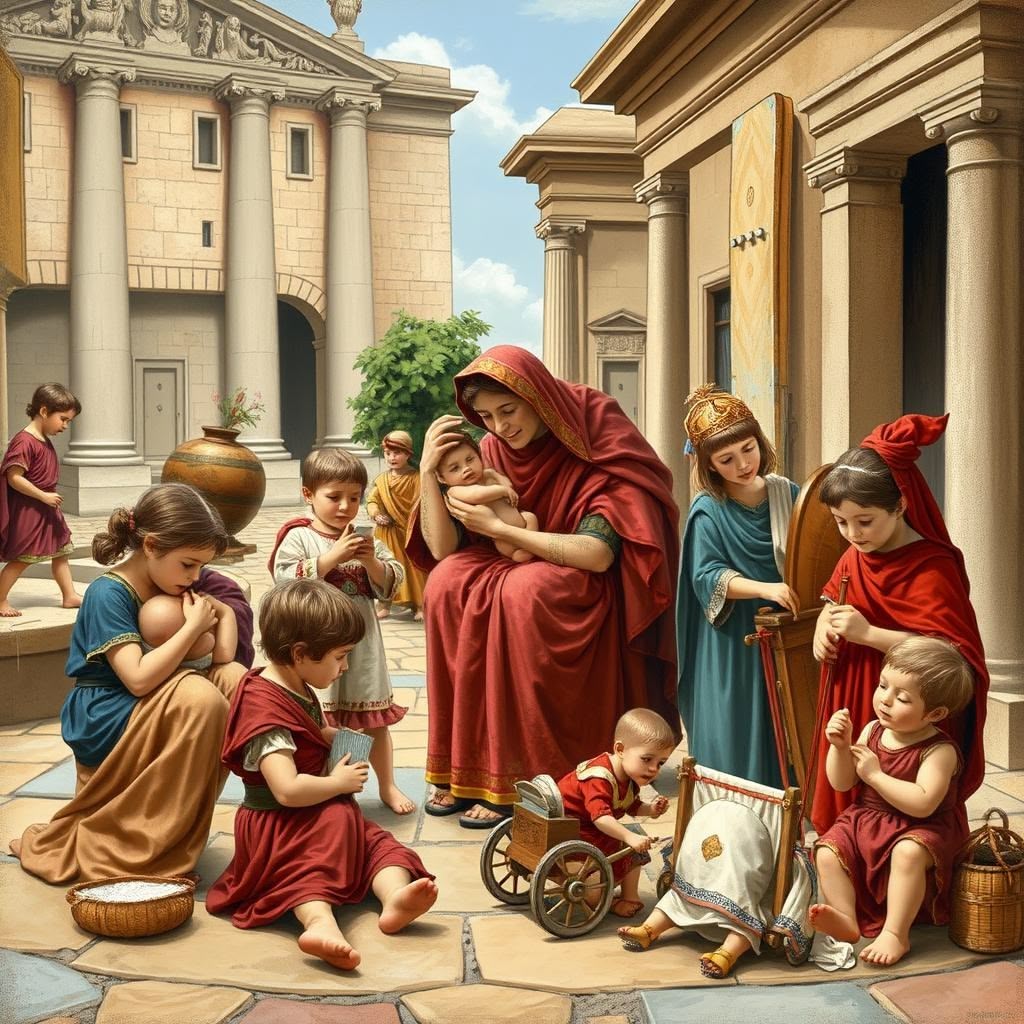
Social Inequalities: The Impact of Status on Roman Childhood
In ancient Rome, social status played a significant role in shaping the childhood experiences of individuals. The upbringing of elite children differed vastly from that of poorer children, creating distinct contrasts in their early lives.
Elite Children
- Elite children had access to high-quality education, often provided by private tutors or attendance at prestigious schools.
- They were groomed for future leadership roles, receiving training in rhetoric, philosophy, and other advanced subjects.
- Opportunities for elite children included participation in political events, cultural activities, and connections with influential figures.
- They enjoyed a life of luxury and comfort, surrounded by expensive toys and leisure activities. Their involvement in the entertainment sector, which included gladiators and chariot races, was a significant part of their privileged lifestyle.
Poorer Children
- Poorer children faced limited educational opportunities and often started working at a young age to support their families.
- Their daily lives revolved around assisting with household chores or labor-intensive tasks to contribute to the family income. This reflects the broader daily life in ancient Rome where social class significantly influenced lifestyle and opportunities.
- Playtime was minimal compared to elite children, focusing more on practical skills rather than leisure activities.
- Access to formal education was rare, with basic literacy and numeracy skills being the extent of their learning.
Overall, social status determined the pathways available to children in ancient Rome. It shaped their educational opportunities, access to resources, and overall quality of childhood experiences. The stark contrast between the lives of elite and poorer children is a reflection of the broader societal structure which also influenced various aspects such as religious practices, legal rights especially for women the legal status of Roman women, and even architectural developments during that era.
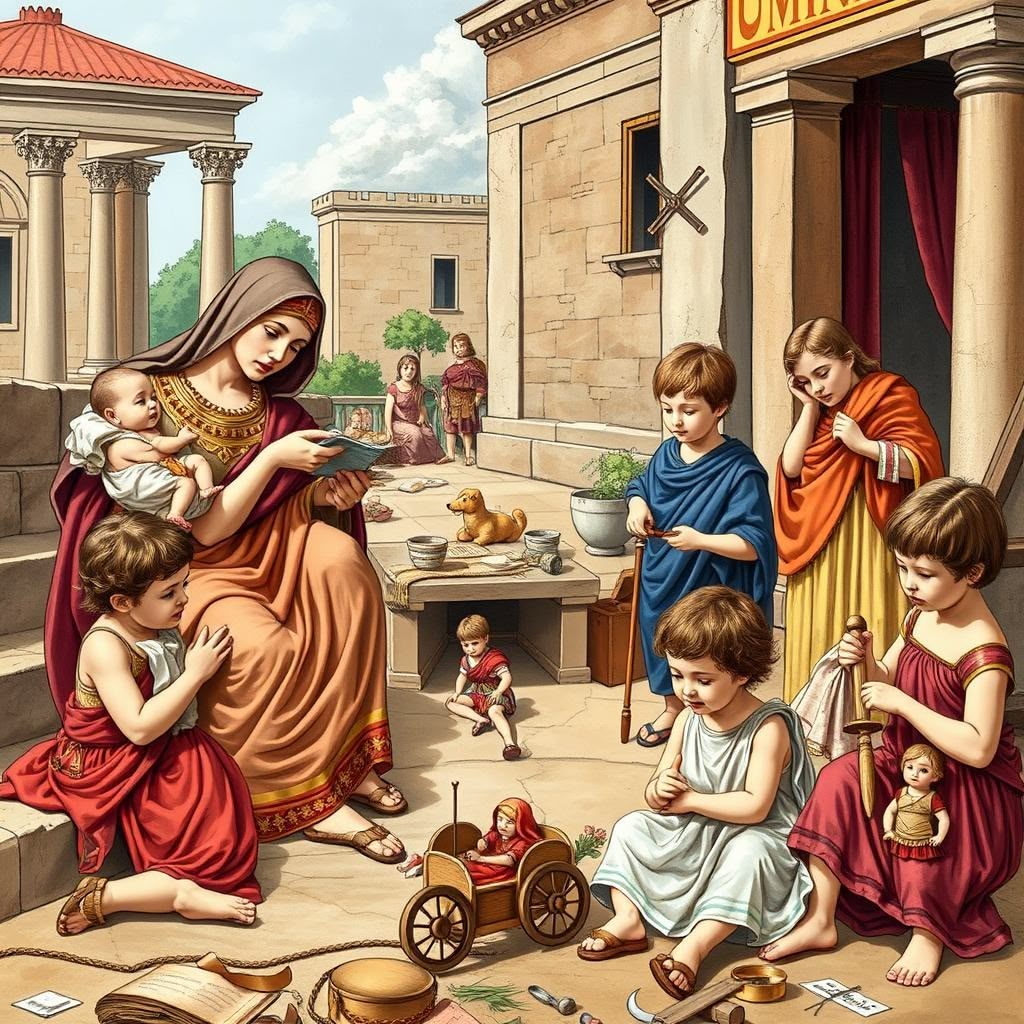
Preparing for Future Roles: Citizenship, Military Service, and Domestic Management in the Empire’s Social Structure
Societal expectations for grooming children into future citizens, soldiers, or household managers within the empire’s social structure were deeply ingrained in Roman society.
1. Citizenship
Children were raised with a strong sense of civic duty and loyalty to Rome. They were taught the importance of contributing to the well-being of the empire as responsible citizens.
2. Military Service
Boys from certain backgrounds were often prepared for military service from a young age. Training in combat skills and discipline was essential to fulfill their roles as future soldiers defending the empire. The Roman Army, a symbol of military power, played a crucial role in the growth and upkeep of the Roman Empire.
3. Household Managers
Girls, on the other hand, were educated in domestic skills to become efficient household managers. They learned about running a household, managing slaves, and ensuring the smooth functioning of family life.
These distinct paths underscored the societal expectations placed on children based on their gender and social status. Roman childhood was not just about growing up but also about preparing for specific roles that would contribute to the functioning and stability of the empire.
Understanding these roles also requires an insight into the lives of plebeians, who represented a significant part of Roman society and significantly influenced its political and economic structures. Furthermore, grasping how these societal roles facilitated the maintenance and expansion of the empire can be better understood through examining aspects such as Roman roads which played an integral part in this process.
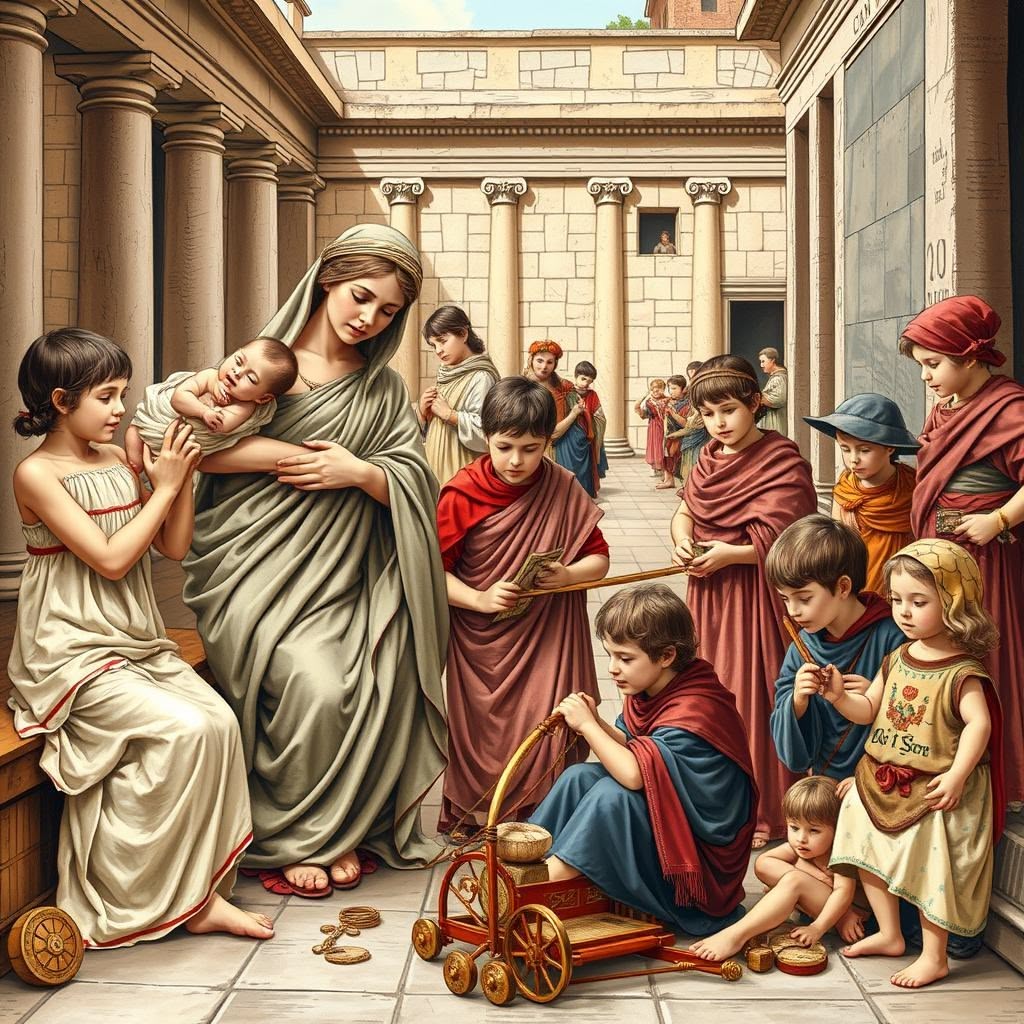
FAQs (Frequently Asked Questions)
What were the distinct phases of childhood in ancient Rome and how did gender roles influence them?
Ancient Roman childhood was divided into distinct phases, beginning with infancy cared for primarily by women. As children grew older, they assumed increasing responsibilities that were heavily influenced by gender roles, with boys and girls preparing for different societal expectations.
How did education and rites of passage shape a child’s future role in Roman society?
Education was crucial in ancient Rome for shaping a child’s future societal role. Rites of passage marked the transition from infancy to youth, with boys typically receiving formal education to prepare for citizenship or military service, while girls were often educated in domestic skills.
What role did family play in shaping the experiences and morals of Roman children?
Family life was central to Roman childhood, with parents responsible for instilling morals and social behaviors. Extended family members also influenced children’s upbringing, contributing to their social education within the empire’s cultural framework.
How did toys and games contribute to socialization among Roman children?
Toys and games in ancient Rome reflected daily life and societal roles, serving as tools for socialization and learning. Popular toys and games helped children understand their expected roles within society through play.
In what ways did social status impact the childhood experiences of elite versus poorer children in ancient Rome?
Social status greatly affected childhood experiences; elite children had greater access to education and opportunities, preparing them for leadership or specialized roles, whereas poorer children faced limited resources and responsibilities often tied to labor or domestic tasks.
How were Roman children prepared for their future roles as citizens, soldiers, or household managers?
Roman society groomed children according to expected future roles: boys were trained for citizenship or military service through education and physical training, while girls were prepared for managing households. This preparation reflected the empire’s social structure and cultural values.

